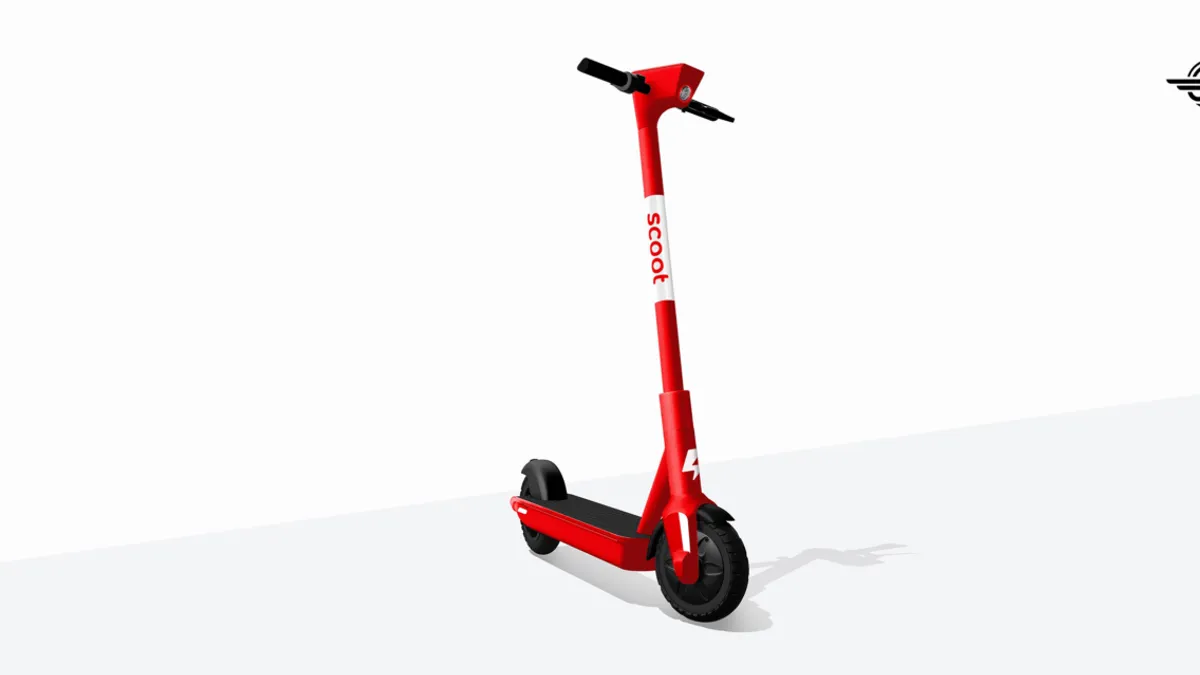Dive Brief:
- E-scooter company Bird has acquired competitor Scoot. The companies said Scoot will retain its name and operate as a wholly-owned subsidiary of Bird.
- In a press release, Bird stated the acquisition will lead to service in new communities and provide users with more vehicles that feature technological advancements.
- "We are thrilled to welcome Scoot to the Bird ecosystem and look forward to working with the Scoot team as we further scale our complementary missions — to replace car trips with micro-mobility options for all," Travis VanderZanden, founder and CEO of Bird, said in a statement. "Together we will make a bigger impact on our riders’ daily lives and the cities we serve."
Dive Insight:
San Francisco-based Scoot was one of the two operators granted permits by the San Francisco Municipal Transit Agency (SFMTA) last year. Other major operators, including Bird, were left out and Lime actually attempted legal action against the city. Bird's acquisition of Scoot now gives it access to the San Francisco market.
The micromobility industry has evolved at a breakneck pace since dockless bikes first hit the United States in 2017. But within the past year, mobility companies have been shifting their attention away from that mode — some even completely abandoning dockless bikes — and toward dockless e-scooters, a sector considered to have large growth potential.
Industry analysts taking note of what happened to the dockless bike market and the rapid increase of entrants to the scooter space have been predicting scooter company consolidations for months. Bird's acquisition of Scoot could signal the start of a consolidation trend.
Consolidation is not unexpected in industries with a limited scope and a rapidly increasing service provider base. It can be hard for newer, smaller businesses to gain enough traction to successfully compete with larger, well-established companies. With micromobility, a limited number of cities allow the devices on their streets, but a lot of operators are trying to get in on the trend. In Chicago, for example, e-scooters will make their first appearance on Saturday and a whopping 10 companies have been authorized to release 250 scooters each. Lesser-known brands like Sherpa and gruv will have to compete with well-established names like Bird, Lime and Lyft.
In addition, the glut of available apps across all industries has led to many consumers experiencing app fatigue. An analysis of Washington, DC's e-scooter pilot program indicated users are less likely to download multiple companies' apps for the same type of service. That problem could be solved with a universal app that shows users every single micromobility device regardless of company, but so far that's not a reality.
Acquisitions and consolidations have been rampant in the mobility space as a whole in the past couple years as the industry changes and companies look to diversify their portfolios to become more holistic transportation service providers. Primary examples include Lyft's acquisition of bike-share company Motivate, and Uber's acqusition of e-bike company Jump. Many anticipate these changes will continue for e-scooters in the foreseeable future and the industry will look quite different in a year than it does now.












